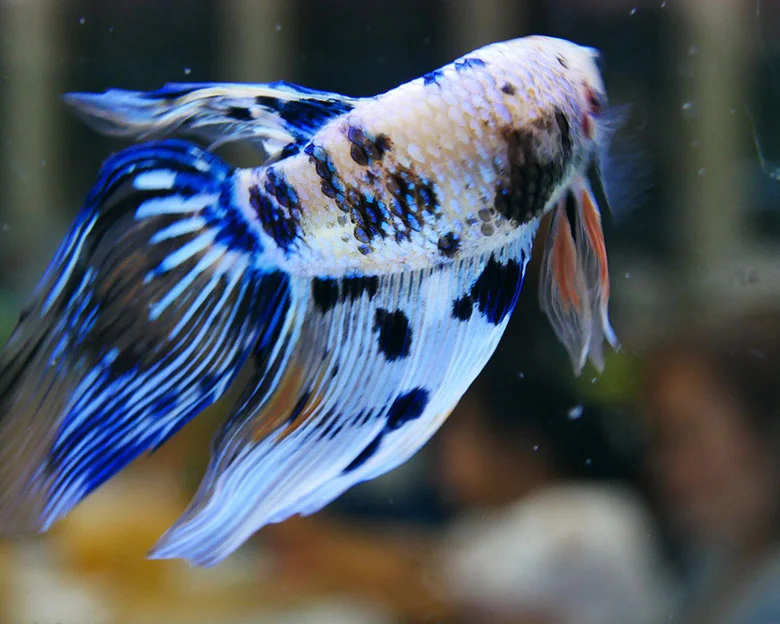Are you a betta fish owner looking for ways to keep your aquatic pet healthy and happy? Aquarium salt may be just what you need. This common treatment is renowned for its ability to promote healing, reduce inflammation, and improve gill function in freshwater fish, including bettas.
But before you reach for the salt, it’s important to understand the potential benefits and risks of using it for your betta.
In this article, we’ll explore the many benefits and uses of aquarium salt for betta fish, and provide guidelines for its correct usage. We’ll also discuss the exceptions and warnings that come with using this treatment, as well as alternative salts that may be better suited for some bettas.
Whether you’re looking to treat fin rot or simply maintain your betta’s health, this article will equip you with the knowledge you need to make the best decision for your aquatic pet.
Key Takeaways
- Aquarium salt can be beneficial for betta fish in treating minor health problems, accelerating healing, reducing inflammation, improving gill function, and promoting electrolyte balance.
- It should be used correctly by only using aquarium salt designed for fish tanks, dissolving it in a separate container before adding it gradually to the tank, and monitoring the betta throughout the treatment period.
- However, it is not effective against serious bacterial infections, severe fungal infections, and diseases affecting internal organs, and can interfere with the efficacy of stronger medications.
- Additionally, some freshwater fish species and aquatic life, such as snails and shrimp, may not tolerate aquarium salt, and it should not be used as a substitute for good fish tank maintenance.
Benefits and Uses

You can use aquarium salt to improve the health and well-being of your betta fish in several ways. Firstly, it can be used as a preventative measure for bettas that are prone to certain infections or diseases.
Aquarium salt also promotes gill function, aids in wound and infection healing, reduces inflammation, and regulates osmotic balance in bettas and other tropical fish. Additionally, it can be helpful in treating fungal infections and fin rot, as well as enhancing and supporting the slime coat of bettas.
However, it’s essential to note that the long-term effects of using aquarium salt aren’t yet fully known. While it can be used to treat minor health problems in most tropical and coldwater freshwater fish, it isn’t effective against serious bacterial infections, severe fungal infections, and diseases affecting internal organs.
Moreover, it can interfere with the efficacy of stronger medications and inhibit plant growth. Therefore, aquarium salt shouldn’t be used as a substitute for good fish tank maintenance, and its usage should be monitored and controlled.
Correct Usage
When using aquarium salt for your betta fish, it’s crucial to dissolve it in a separate container with water from your betta’s tank. Gradually adding the dissolved salt will prevent sudden changes in water parameters, which can stress your betta fish. Additionally, monitoring your betta’s behavior throughout the treatment period is essential to ensure their health and comfort.
To help you use aquarium salt for your betta fish correctly, here are some tips to follow:
- Use only aquarium salt specifically designed for fish tanks.
- Dissolve the salt in a separate container with water from your betta’s tank.
- Add the dissolved salt gradually to avoid sudden changes in water parameters.
- Monitor your betta fish throughout the treatment period.
While aquarium salt has many benefits, it’s important to note that using too much or too little salt concentration can pose potential risks to your betta fish. Therefore, it’s vital to follow the correct usage guidelines and seek professional advice when in doubt.
Exceptions and Warnings
It is important to note that certain freshwater fish species and aquatic life, such as snails and shrimp, may be more sensitive to the use of salt in a fish tank. While aquarium salt can be beneficial for betta fish, it is crucial to consider the potential risks to other tank inhabitants. The table below provides a summary of fish species and aquatic life that should not be exposed to aquarium salt, as well as their potential reactions.
| Species | Potential Reactions |
|---|---|
| Corydoras Catfish | Salt can cause kidney damage |
| Freshwater Snails | Salt can cause dehydration and death |
| Ghost Shrimp | Salt can cause stress and death |
| Neon Tetras | Salt can cause kidney damage |
It is also important to note that while aquarium salt is generally safe for betta fish, it can interfere with the efficacy of certain medications used to treat diseases. Therefore, it is important to consult with a veterinarian or fish expert before using aquarium salt as part of a disease treatment plan. Additionally, live aquarium plants may be sensitive to salt and can be negatively impacted by its use. As with any fish tank additive, proper research and careful consideration should be taken before adding aquarium salt to ensure compatibility with other tank inhabitants.
Alternative Salts
Using alternative salts, such as Epsom salt, kosher salt, or rock salt, can be a safer option for some aquarium inhabitants and can still provide benefits similar to traditional aquarium salt.
Epsom salt, also known as magnesium sulfate, can improve betta fish health by helping to reduce swelling and inflammation, as well as promoting healthy digestion. Additionally, Epsom salt can be used to treat constipation and swim bladder issues in betta fish.
Types of rock salt, such as Himalayan pink salt, can also be used in aquariums as a safer alternative to traditional aquarium salt. Himalayan pink salt contains over 80 minerals and can help to regulate the pH levels in the tank, as well as providing essential minerals for fish health.
However, it’s important to note that not all rock salt is suitable for aquarium use, as some may contain harmful additives. It’s recommended to research and choose a reputable brand of rock salt specifically designed for aquarium use.
Treatment for Fin Rot
To treat fin rot in your betta, it’s important to use the correct type of salt and to follow a specific treatment plan. Dissolve a small amount of aquarium salt in a separate container of water and gradually add it to the tank.
It’s important to monitor your betta’s health throughout the 7-day treatment period to ensure that the salt is not causing any negative effects. Aquarium salt can be a helpful preventative measure for bettas prone to fin rot, but it’s important to identify the condition early and to take steps to prevent it from occurring in the first place.
When treating fin rot with aquarium salt, it’s important to remember that it’s not a substitute for good fish tank maintenance. Poor water quality can be a contributing factor to the development of fin rot, so it’s important to maintain a clean and healthy tank environment.
Additionally, if the condition is severe or if it doesn’t respond to aquarium salt treatment, it may be necessary to use an antifungal medication specifically formulated for aquarium fish. By taking preventative measures and identifying fin rot early, you can help ensure the health and well-being of your betta fish.
Monitoring Betta Health
Make sure you keep a close eye on your betta’s overall health and behavior, as changes in appetite, activity levels, or appearance could be a sign of a health issue that needs to be addressed. As a responsible betta owner, it’s important to identify symptoms of illness before they become serious and potentially fatal.
Some common signs of a sick betta include lethargy, loss of appetite, clamped fins, abnormal swimming behavior, and discoloration.
Preventive measures can also be taken to maintain your betta’s health. These include regular water changes, proper tank filtration, and providing a balanced and nutritious diet. It’s also important to avoid overfeeding your betta, as this can lead to health problems such as constipation and bloating. By monitoring your betta’s health and taking preventive measures, you can help ensure that your beloved fish stays healthy and happy.
Interference with Medications
If you’re treating your betta fish with medication, be aware that aquarium salt may interfere with its efficacy. While aquarium salt has many benefits, it’s not effective against serious bacterial infections, severe fungal infections, and diseases affecting internal organs.
Additionally, if used as part of disease treatment, it can interfere with the efficacy of some medications. This is because aquarium salt alters the osmotic balance of the water, which can affect how medications are absorbed by the fish.
Therefore, it’s important to understand the contraindications of using aquarium salt with medication. If your betta fish is being treated for a serious bacterial infection, severe fungal infection, or disease affecting internal organs, aquarium salt should not be used as a treatment option. Instead, you should explore alternatives, such as specific medications formulated for fish, to ensure the best possible outcome for your betta’s health.
Always consult with a veterinarian or aquatic specialist before administering any type of medication or treatment to your betta fish.
Not a Substitute for Good Maintenance

Maintaining a clean and healthy environment for your pet is crucial, but relying solely on the use of aquarium salt isn’t sustainable. While it can help treat minor health problems and aid in healing, it’s not a substitute for good tank maintenance.
Regular water changes, proper filtration, and a balanced diet are all essential factors in keeping your betta fish healthy and happy. Neglecting regular maintenance can lead to a buildup of harmful toxins and bacteria in the tank, which can cause stress, illness, and even death in your betta fish.
Therefore, it’s important to establish a cleaning schedule and stick to it. This includes performing water changes every week, vacuuming the gravel, and cleaning the filter regularly. By keeping your betta fish’s tank clean and well-maintained, you can prevent many common health problems and ensure that your pet thrives in its environment.
Frequently Asked Questions
Can Aquarium Salt Be Used In Saltwater Aquariums Or Is It Only For Freshwater Aquariums?
Aquarium salt should only be used in freshwater aquariums and not in saltwater aquariums. It helps treat minor health issues in most freshwater fish and should be dissolved in a separate container before being gradually added to the tank to avoid sudden changes in water parameters.
How Often Should Aquarium Salt Be Used For Preventive Care In Betta Fish?
For preventive measures, use a small dose of aquarium salt in your betta tank for 7-10 days. Gradually increase salt concentration to avoid sudden changes. Monitor your betta’s reaction and discontinue gradually.
Can Aquarium Salt Be Harmful To Betta Fish If Used Incorrectly?
Improper dosage of aquarium salt can lead to potential dangers for betta fish. It can cause dehydration, stress, and interfere with medication efficacy. It’s crucial to follow proper dosage guidelines and monitor your betta’s health during treatment.
Are There Any Long-Term Effects Of Using Aquarium Salt In A Betta Tank?
Using aquarium salt in a betta tank can have long-term effects on their health and wellness. While it can improve gill function and aid in healing, prolonged exposure can cause dehydration and inhibit plant growth. Good tank maintenance is still crucial for betta health.
Can Aquarium Salt Be Used To Treat All Types Of Bacterial Infections In Betta Fish?
While aquarium salt can be effective in treating some bacterial infections in betta fish, it’s important to weigh the pros and cons. Alternative treatments, such as antibiotics, may be necessary for serious infections. Always consult with a veterinarian.

